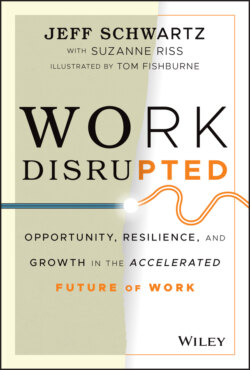Читать книгу Work Disrupted - Jeff Schwartz - Страница 11
Our Frame
ОглавлениеI didn't study the future of work or adaptability in school—nobody does. In retrospect, I see that I've been remarkably prepared to help business leaders understand the future world of work in part because of what I learned as an undergraduate and graduate student studying history, philosophy, and government, and then business and economics, and, perhaps most of all, as a result of experiences exposing and preparing me for the breadth of what has been unfolding during our lifetimes. In 1983 I was completing my service as a Peace Corps teacher in Nepal, one of the world's most beautiful and poorest countries, where I taught math and science in a village with no running water or electricity, a village that was a day's walk to a road. Two years later, in the summer of 1985, I was a summer associate in corporate finance on Park Avenue in New York. Somewhere between Nepal and New York City, I'd been lucky to have been exposed to vastly different faces of the human experience.
What I continue to learn, and what I hope my daughters are learning, is that how we frame the world, what we think is relevant and possible, shapes what we can do and what we actually do. New times and new conditions create new opportunities. Unless we reshape our views—our time horizons, relationships, speed—we will miss opportunities. For us as individuals, and as organizations and communities, Covid-19 has indeed been an accelerator to the future. But the future was already underway, with opportunities for people and machines to work together, and careers composed of chapters of reinvention. To embrace all that's possible, a new mindset—a growth mindset—is critical.
The concept of a growth mindset, developed by psychologist Carol Dweck, speaks to our capacity for change and growth. She contrasts a growth mindset with a limiting view, what she calls a fixed mindset. Her research demonstrates that much of what we think we understand about ourselves and what we can do comes from our mindset. This can either propel us forward or prevent us from fulfilling our potential. According to Dweck, whether or not we're aware of our mental models, they can have a profound effect on our skill acquisition, personal relationships, professional success, and many other dimensions of life. People with a growth mindset believe that their most fundamental abilities can be developed through dedication and hard work. This view builds a love of learning and a resilience that will serve us well in the future world of work. People with fixed mindsets believe they're good or bad at something based on their inherent nature, closing out the possibility that they can acquire new skills and capabilities. Similarly, editor and anthropologist Gillian Tett teaches us that the way we label and categorize the world indeed influences what we think we can do.
